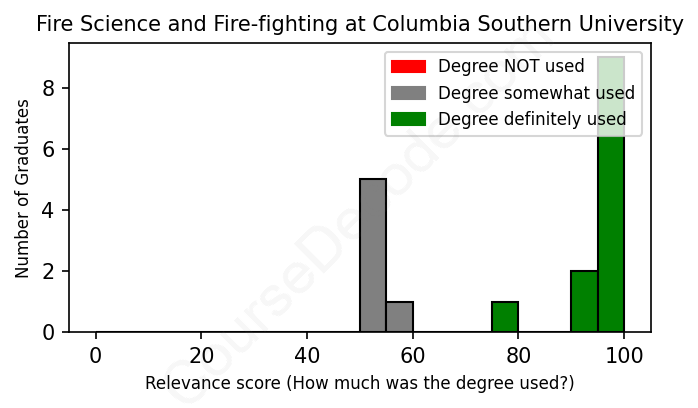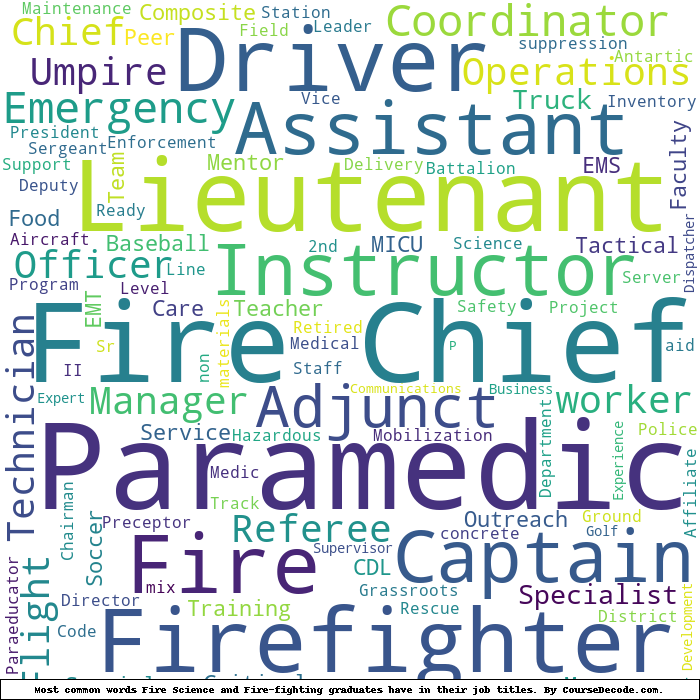
First, some facts. Of the Fire Science and Fire-fighting graduates from Columbia Southern University we've analyzed , here's how many have used (or NOT used) their degree in their career:

These are estimates based on AI analysis of 18 LinkedIn profiles (see below).
The verdict? Significantly above average. Overall, with an average relevance score of 81%, Fire Science and Fire-fighting graduates from Columbia Southern University have a much higher likelihood (+14%) of finding work in this field compared to the average graduate across all fields:
And for comparison, here's the chart for all profiles we've looked at across all degrees.
Also, after graduating, 38% of these graduates have pursued further education other than another Bachelor's degree (such as a Masters degree or other), compared to the average across all profiles of 35%. This suggests you may need more than just a Bachelors degree to be competitive as a Fire Science and Fire-fighting graduate.
See the details:
|
Relevance score: 50% We think this person has gone into a career only somewhat relevant to their degree. We think this person has gone into a career only somewhat relevant to their degree.
DEGREE INFOGraduated in 2014 from Columbia Southern University with a Bachelor of Applied Science (B.A.Sc.) in Fire Science and Fire-fighting. No other secondary education since. JOB HISTORY SINCE GRADUATIONBusiness Development Manager Jenkins Restorations Oct 2017 - Present ABOUTNo information provided. |
The top 10 most common jobs done by the graduates we've analyzed (ranked most common to least) are:
From the analysis of LinkedIn profiles of graduates from Columbia Southern University with degrees in Fire Science and Fire-fighting, it seems that the most common types of jobs are concentrated around firefighting roles, management positions within fire departments, and instructional roles related to fire science. Many graduates have progressed to significant leadership positions such as Fire Chief, Captain, or Deputy Chief, showcasing the degree’s relevance and the graduates' expertise in fire science principles. These positions involve not just direct application of firefighting skills, but also the necessary training, emergency response, and strategic planning skills that are crucial for effective management in fire services.
Overall, many of these jobs are indeed highly relevant to Fire Science and Fire-fighting. Roles like Firefighter, Lieutenant, and Fire Chief directly apply the knowledge and skills acquired during their academic training. However, there are also some positions, especially those in education or business development, that only tangentially relate to fire science, indicating a diversification in career paths. Still, the majority of the analyzed profiles showcase a strong connection to the field, either through direct firefighting duties or through positions that require a solid foundation in fire science competencies. It's a promising indication that a degree in Fire Science from Columbia Southern University can lead to impactful and relevant careers in emergency services.
Here is a visual representation of the most common words in job titles for Fire Science and Fire-fighting graduates (this is across all Fire Science and Fire-fighting graduates we've analyzed, not just those who went to Columbia Southern University):

Graduates from Columbia Southern University who studied Fire Science and Fire-fighting generally show a solid career trajectory that aligns well with their field of study. Many of them kick off their careers in roles directly related to fire-fighting or emergency management, such as firefighter, lieutenant, or EMS paramedic, shortly after graduation. For instance, several individuals took on firefighter positions within just a year or two of completing their degrees, which points to a strong initial entry into the fire service industry. It’s common to see graduates start in frontline positions, working their way up while gaining crucial experience in emergency response and fire safety.
As time goes on, say five or ten years after graduating, many have transitioned into higher-ranking roles such as captain, chief, or even structural and operational leadership positions. For example, some individuals moved up the ranks to become Assistant Fire Chiefs or Fire Chiefs within various fire departments. Additionally, there are graduates who have taken on educator roles as adjunct instructors, contributing to the field by teaching future fire service professionals. Overall, this data suggests that graduates from this program typically find fulfilling careers closely related to fire science, with many advancing to leadership roles in emergency services. So, while the path after graduation is rarely a straight shot, most seem to land well within the fire-fighting and emergency management field, making a positive impact in their communities.
A Bachelor’s degree in Fire Science and Fire-fighting can be pretty manageable, especially at Columbia Southern University, which is known for its online programs. The coursework usually involves a mix of practical and theoretical subjects, which means you get to learn about fire behavior, fire prevention, and emergency management, but you're also handling a good amount of reading and assignments. Overall, it's not the hardest degree out there, but it does require commitment and a willingness to engage with the material. If you're someone who's motivated and has an interest in the subject, you might find it more on the easier side compared to some other majors. Plus, the flexibility of the online format can help you balance your studies with other responsibilities.
Most commonly, in the LinkedIn profiles we've looked at, it takes people 2 years to finish a Bachelor degree in Fire Science and Fire-fighting.
Looking at the career paths of these Fire Science graduates from Columbia Southern University, it seems like they're generally doing pretty well financially. Many of them have climbed the ranks in fire departments, moving up to positions like Captain and Deputy Chief, which usually come with decent salaries and benefits. Some have also taken on dual roles as educators, like adjunct instructors, which can add to their income. The pattern of advancing into leadership roles—like Fire Chief—suggests they’re not just gaining experience but likely making good money too. That said, some have side gigs or roles in different fields, which might indicate they’re also looking to boost their earnings or pursue other interests. Overall, it's a mixed bag, but the upward trend in their roles points to a solid financial situation for most.
Here is a visual representation of the most common words seen in the "about" section of LinkedIn profiles who have a Bachelor degree in Fire Science and Fire-fighting (this is across all Fire Science and Fire-fighting graduates we've analyzed, not just those who went to Columbia Southern University). This may or may not be useful:

Here are all colleges offering a Bachelor degree in Fire Science and Fire-fighting (ordered by the average relevance score of their Fire Science and Fire-fighting graduates, best to worst) where we have analyzed at least 10 of their graduates:
| College | Score | Count |
|---|---|---|
 Columbia Southern University Columbia Southern University
|
81 | 18 |